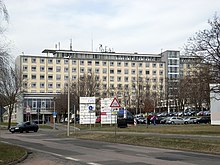German Fuel Institute
The German Fuel Institute ( DBI for short , sometimes called the Freiberg Fuel Institute ) was a research institute for the coal and energy industry in the GDR , which dealt with basic research , practice-oriented research and rationalization .
The lignite had a very high importance for the energy industry and the chemical industry in the GDR. The research capacities available in the GDR in the field of fuel technology no longer met the requirements, so that a suitable institution had to be created.
history
founding
The institute was founded on November 1st, 1956 by order of the Minister for Coal and Energy of the GDR. The focus of activity was the extraction and refining of fuels. After this establishment, the Rostock Peat Institute , the Bitterfeld experimental briquette factory and the Siegmar-Schongau experimental coking plant were affiliated to the German Fuel Institute .
The Freiberg location was chosen due to its proximity to the Freiberg Mining Academy, where appropriate scientific staff was trained. The fact that Freiberg was designated as the seat of this research facility also had a historical background. The State Brown Coal Research Institute, which later became part of the Bergakademie, has been located here since 1924. The director of the German Fuel Institute should become a professor with a chair at the Bergakademie.
development
The institute developed into the scientific and technical center of the coal and gas industries in the GDR. From 1961 to 1964 a new institute building was built in Freiberg, Halsbrücker Straße 34. 35 million marks were available for this. Offices, laboratories and test facilities were created for around 600 employees.
In the 1970s, the fuel institute was integrated into the Schwarze Pumpe gas combine as a research center, but still had tasks to solve for all areas of the energy industry.
From 1986, the thirtieth year of its existence, until 1990, the German Fuel Institute (branch offices moved in) employed around a thousand people in various specialist areas.
Temporary name change
After Erich Honecker came to power in 1971 and the associated change in Germany policy, the word "Germany" was avoided in companies and public institutions, so that the name of the German Fuel Institute was changed to Fuel Institute Freiberg (BIF) . From 1990 the original name was used again.
Dissolution and succession
With the political turnaround , a privatization process began in the new federal states, so that the previously state-owned fuel institute Freiberg was reorganized into the German fuel institute GmbH on July 1, 1990. As a result, individual divisions and specialist areas were split off and several spin-offs. This ultimately led to the dissolution of the German Fuel Institute as a large East German research institution.
The companies DBI Gas- und Umwelttechnik GmbH and the DBI Gastechnological Institute gGmbH exist as successors to the German Fuel Institute .
Organization and tasks
Directors
The co-founders and the first directors of the German Fuel Institute were Professors Anton Lissner and Erich Rammler . Together with Georg Bilkenroth , Erich Rammler had developed a smeltable high-temperature brown coal coke (BHT coke) and applied for a patent in 1952, which qualified him to head the institute. Further directors were Klaus Strzodka , Bernhard Kahn and Horst Brandt .
Departments
The institute is divided into the following departments:
- Coal refinement
- Gas generation
- Gas transport
- Gas storage
- Gas application
- Nuclear technology
- geology
- Extraction technology
- Mechanical engineering
- Science development
- Economy
Focus of work
The main focal points of the work were briquetting and coal liquefaction :
Briquetting
The institute had the prerequisites for solving briquetting problems including the preparation of the goods to be briquetted. Particular experience has been in the area of binderless briquetting of soft lignite. The technical requirements made it possible to work on all topics of briquetting on a laboratory scale as well as in a semi-industrial test facility.
Coal liquefaction
Since 1981 the institute has been working on the development of a process for the hydrogenation of lignite in the sump phase. For this purpose, a small-scale test facility was built and operated.
International cooperation
The institute worked in numerous international research bodies, in particular with partner institutions at the level of the Council for Mutual Economic Aid (RGW), e.g. B. in Moscow, Tashkent, Warsaw, Katowice, Kraków, Prague, Brno, Budapest, Sofia, Bucharest and Miskolc. Here the DBI represented the GDR in the coordination centers of the Comecon member countries for the fields of coal refining and gas use. Furthermore, the DBI was appointed national body in the international information system science and technology "INFOMNEFTEGAZ".
literature
- Collective of authors: Neubert, S., Kroll, F., Bratke, M., Bartzsch R., Hartung, W .: Fuel Institute Freiberg Chronik 1956–1969; Large graphic enterprise Völkerfreundschaft Dresden; 1985
- NN: Fuel Institute Freiberg 1956–1986 (information brochure); Freiberg 1986
Web links
- Website of the DBI Gastechnological Institute gGmbH (non-profit GmbH)
- Website of DBI Gas- und Umwelttechnik GmbH
Coordinates: 50 ° 55 ′ 45.1 ″ N , 13 ° 20 ′ 53 ″ E
